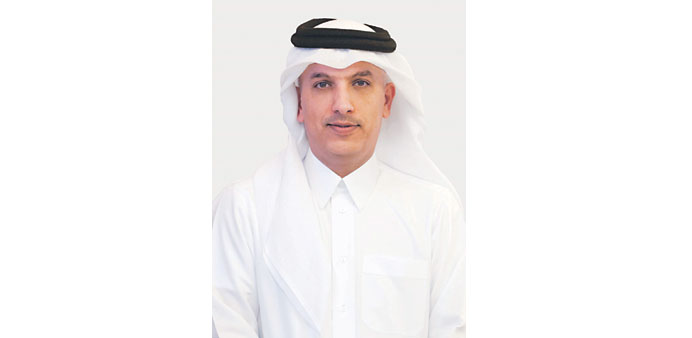During the eight years as the chief executive officer of QNB, HE Ali Sherif al-Emadi, who has been appointed Finance Minister in the new Qatari government, helped build the company into the Middle East’s biggest lender. QNB grew its assets to more than $100bn in the period, the only Arab bank to reach that threshold, according to Bloomberg data
Bloomberg/Doha
For HE Ali Sherif al-Emadi, managing the finances of the world’s richest country is a job he has already been involved in for eight years.
During that time, the chief executive officer of QNB, who was appointed Finance Minister in the new Qatari government late on Wednesday, helped build the company into the Middle East’s biggest lender. QNB grew its assets to more than $100bn in the period, the only Arab bank to reach that threshold, data compiled by Bloomberg show.
“Qatar National Bank closed some of the key acquisitions outside Qatar and grew significantly in size under the leadership of Ali Sherif al-Emadi,” Amol Shitole, a credit analyst with SJS in Bangalore, India, said by e-mail on Thursday. “The bank has a clear strategy in place to expand internationally by carefully selecting markets.”
The Doha-based bank mirrored the expansion of the energy-rich Gulf nation as it developed into a regional power and worldwide investor. Qatar bought stakes in Barclays, the UK’s second-biggest bank, and Volkswagen, Europe’s largest carmaker. The country lent $8bn to Egypt’s post-Hosni Mubarak government.
QNB’s growth was fuelled by expansion into 25 countries in the Middle East, Asia and Europe.
“QNB has benefited significantly as the national champion for Qatar,” Giyas Gokkent, chief economist at the National Bank of Abu Dhabi, the UAE’s biggest bank, said in an e-mail. “I would not expect a change in direction. They are clearly committed to rapid international expansion and will remain a core enabler for the Qatari diversification drive.”
Al-Emadi will take over the finances of a country whose natural-gas exports gave it the largest per capita gross domestic product in the world, according to the International Monetary Fund. Qatar plans to spend $200bn on infrastructure before hosting the 2022 soccer World Cup, the most-watched sporting event.
A finance graduate from the University of Arizona, al-Emadi said his bank, ranked the world’s strongest this year by Bloomberg Markets magazine, benefited from adversity. As economic turmoil engulfed other lenders, QNB looked to expand, he said.
During 2012, the bank purchased stakes in Iraqi and Libyan lenders. In March this year, it bought the Egyptian unit of France’s Societe Generale for $2.45bn. In April 2012, it sought to acquire Turkey’s Denizbank AS, eventually losing out to Moscow-based Sberbank. In 2011, QNB acquired a controlling stake in Indonesia’s PT Bank Kesawan.
While the bank benefited from the government’s purchase of its real estate investments after the onslaught of the financial crisis in 2008, it didn’t need to receive government money.
“We always see good liquidity coming to us when things get bad in the market,” al-Emadi said in a March interview at QNB’s headquarters. “That’s a very strong signal from customers and investors that they view the bank as a safe haven.”
Fifty-percent government-owned, QNB grew on the back of Qatar’s own economic expansion, which averaged 13% annually in the five years ended 2012. The growth was driven by rising exports of liquefied natural gas, with Qatar the source of about 30% of the world’s supply.
Al-Emadi has worked with QNB since 2001, according to his resume. Prior to that, he served in the banking control department of the Qatar Central Bank.
“It is always a blow when a long-standing CEO departs, particularly after a period of tremendous growth,” Emad Mostaque, a London-based strategist at Noah Capital Markets EMEA Ltd, said by e-mail. “QNB has strong ties to the government across the board and remains a national champion and will receive considerable government backing.”

